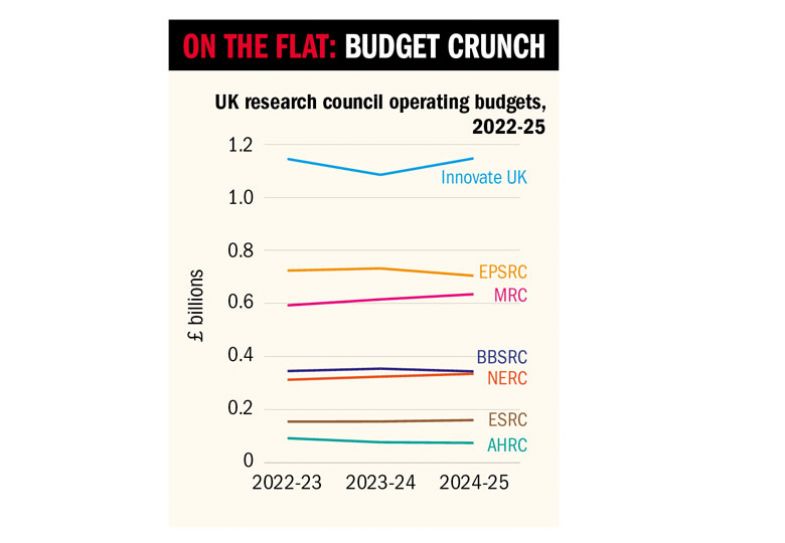Substantial cuts to research budgets at some of the UK’s main funders are likely to worsen “a growing disconnect” between frustrated university leaders and government ministers who insist science is enjoying major funding uplifts, it has been warned.
While politicians have been bullish about their financial backing for Britain’s “science superpower” ambitions, with science minister George Freeman recently trumpeting the “incredible wall of money” heading to science as investment hits £22 billion in 2024-25, budgets for some of the funding councils under UK Research and Innovation will fall next year.
Data collected by Times Higher Education from strategic delivery plans outline how budgets at three councils – the Arts and Humanities Research Council (AHRC), the Engineering and Physical Sciences Research Council (EPSRC) and the Biotechnology and Biological Sciences Research Council (BBSRC) – will dip in 2024-25 as several UKRI-wide programmes from the Cameron and Johnson governments wind down.
One of the biggest losers is the EPSRC, which received £53 million from the Strategic Priorities Fund and £50.4 million from other time-limited funding streams in 2022-23 on top of its core funding of £620 million. While its core funding will rise to £661 million in 2024-25, the removal of about £100 million in additional funds will see its research budget, excluding infrastructure, drop from £723.9 million to £704.5 million over the two-year period – a 2.7 per cent cut.
At the AHRC, which recently announced plans to cut its PhD studentships by more than a quarter, its research budget will fall from £91.6 million to £74 million – 19.2 per cent – over the same two-year period, following the loss of almost £17 million in central funds related to industrial strategy and international collaboration.
A similar picture emerges at the BBSRC, where improved core funding for 2024-25 will be wiped out by losses of funds launched when George Osborne was chancellor.

“It’s a flat-cash settlement [for research councils] at best – we’re now seeing reductions for the funding available for traditional bottom-up principal investigator-led grant proposals on which many researchers rely,” explained John Womersley, a former executive chair of the Science and Technology Facilities Council (STFC). “That’s been reducing as a fraction of available research funding, but it’s now falling in absolute terms.”
Flat-cash settlements for research councils have been mitigated in recent years by an “unseen internal bidding process” within UKRI in which funders applied for top-up income streams related to levelling up, industrial strategy and improving productivity, but these were now coming to the end of their lifetimes, continued Professor Womersley, now a visiting professor of physics at the University of Oxford.
“This has masked the problem that research councils are not getting the big uplifts that ministers seem to believe they’re giving to science,” said Professor Womersley, who added that most of the latest promised extra funds had gone to large infrastructure projects or quality-related research for universities.
“There’s a growing disconnect between the very positive rhetoric from government about supporting science and what the average university-based researcher sees – I can only see things getting worse over the next few years as grant success rates fall,” added Professor Womersley.
Graeme Reid, professor of science and research policy at UCL, said it was important to have clarity about the state of individual research council funding, which was complicated by reports of rising core research budgets in some UKRI documents at the same time as reductions to other funding streams.
“That clarity – where you could see the funding picture across the entire system – has been lost,” said Professor Reid, who urged UKRI to produce “straightforward descriptions of the allocation of resources within UKRI”.
A UKRI spokesman said: “Council core [research and innovation] budgets as shown do not include funding for existing time-limited commitments, infrastructure, strategic programmes and collective talent…Taken together, there is a growing trend in the volume of research delivered in each year of the spending review for the research councils as a whole, including strategic and responsive research grants.”




